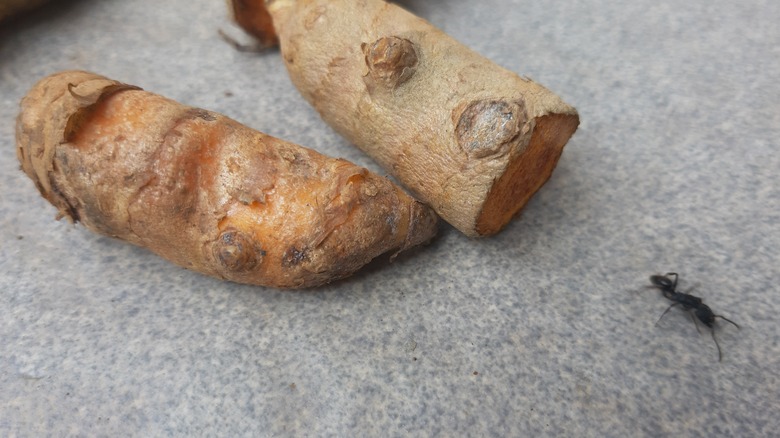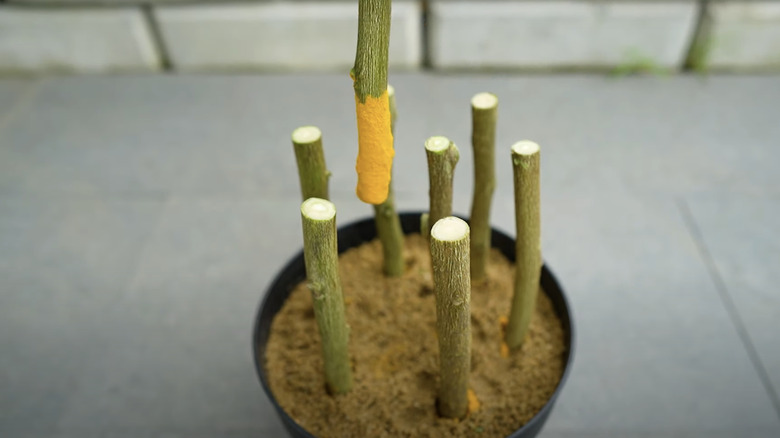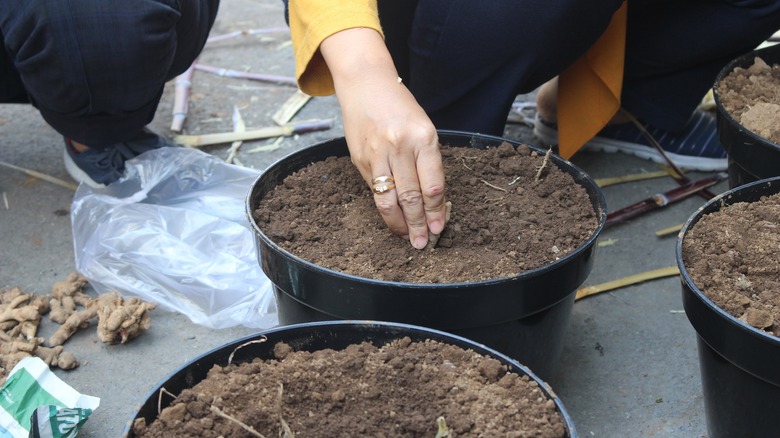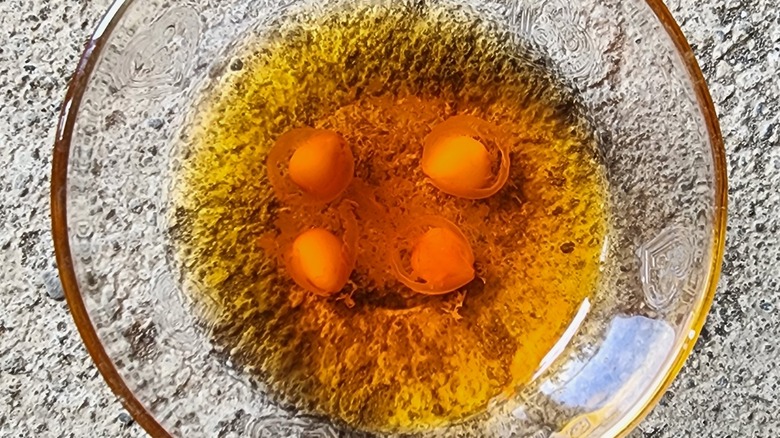Clever Reasons You Should Be Incorporating Turmeric Into Your Garden
Turmeric has long been a core tenant of Ayurvedic medicine, and Western medicine practitioners are also starting to look closer at the so-called golden spice. The root has been marketed, among many other things, as a successful anti-inflammatory, leading to a boom in turmeric imports and sales in the United States. While plenty of research remains necessary before doctors start prescribing turmeric, it's becoming clear that the plant has several real health benefits — it can even help you treat infected cuts. But that's not what we're here to talk about. We're here to find out what turmeric can do for the health of your garden.
It turns out that turmeric might bring wide-ranging benefits, both for your gut biome and the biome that houses your garden. A few clever tricks hidden inside the orange spice might help boost your plants' germination, help fight off fungi, and produce better yield. The best part is that so far, there have been no drawbacks to giving it a try. You won't need to plant turmeric to take advantage of these hacks; most of these techniques will work just fine with store-bought turmeric powder. Let's learn about a few clever tricks turmeric has and explore why you should consider using the golden spice in your garden.
Turmeric is a natural ant repellent
Ants can wreak havoc on your garden, and it often feels like the only way to get rid of them is harmful pesticides that might do more harm than good. The best solution to any pest problem is the power of plants that repel ants naturally. One of those plants is turmeric, whose scent has the potential to work as an excellent ant deterrent.
We might recognize the smell of sauteing turmeric as a delicious sign that dinner is around the corner, but ants can't stand it. Essential oil containing turmeric active ingredients was found effective in repelling fire ants in a study published in early 2024 by the Journal of Medical Entomology. The journal acknowledges that more work needs to be done to confirm turmeric's efficacy, but the science is promising.
The idea that you can help control your ant population without relying on synthetic ingredients or poisonous pesticides is a big deal. The best part is that you don't even need to whip up any special recipes or follow strict instructions to activate your turmeric ant repellent to use this pest control technique. Any powdered turmeric should do the trick. All you need to do is take a few healthy pinches of turmeric in powdered form and sprinkle it anywhere in your garden that you don't want ants to cross.
Turmeric shows promise as a rooting agent
Propagating your plants is a great way to share gardens with your friends and family or help your garden build upon itself. Making sure your new plant-cutting takes root is a critical moment, critical enough that some gardeners turn to synthetic root hormones to help the process. While there's nothing necessarily wrong with those synthetic options, you might not need to turn to those chemicals. Instead, you can try turmeric as an organic rooting hormone.
Each plant species responds differently to rooting agents, so there is no guarantee that turmeric will work for every new root. However, some gardeners swear by propagating their new cuttings with turmeric powder and water. The technique is especially favored when propagating plants like citrus trees – a family of plants that has shown itself to be especially picky about sprouting new roots.
All you need to do to help spread new roots is wet the clipping and cover its base in a healthy dose of turmeric powder. You only need to spread turmeric on the clipping part that will be buried in the soil. After giving it a bit of golden spice, plant the clipping in a planter full of healthy soil and sit back while your new roots take hold. Take things a step further and give your clipping a blend of turmeric and cinnamon to work wonders in your garden and help ensure that any new roots you plant firmly take hold.
Prevent common plant fungal diseases
Turmeric's antifungal properties have been confirmed in laboratory studies. Spreading the spice around your plants will give them backup in the battle against fungal takeovers. In a study published in Zoo Botanica, turmeric plant extract was nearly 75% effective against Fusarium oxysporum and Rhizoctonia solani, which are two common disease-causing fungi in plants. This confirms what many gardeners already practice. Turmeric spray is sometimes used to help plants fight off powdery mildew, a common garden fungus that can appear on plants if a garden is overwatered.
Another study found in The Pharma Innovation concluded that Turmeric was the second-most effective natural powdery mildew treatment, ranking just behind a garlic extract solution in preventing fungal growth. Agricultural institutions like the Tamil Nadu Agricultural University have taken the data and run with it, confidently presenting turmeric as part of a natural solution to powdery mildew. Their recipe to banish powdery mildew involves a blend of aloe vera, tender bamboo leaves, pseudomonas fluorescence, and turmeric powder mixed together with water and sprayed on your plants regularly.
To employ turmeric as a fungicide, add one teaspoon of turmeric to a standardized spray bottle and fill the rest with water. Depending on the details of your particular outbreak, you can add garlic extract, aloe vera, or any other secret weapon you need. Once you've got your mix, spray it on your plants every morning for the best results.
Use turmeric to enrich your soil
This one makes a lot of sense the more you think about it. If turmeric is full of nutrients that can help our bodies, why wouldn't those same nutrients work well on your soil? Chilean plant scientists sought to answer that question, studying the effects of using a turmeric-based fertilizer to plant tomatoes. The results of their study published in Agro Sur were promising. The researchers found that a fertilizer that combined turmeric, coffee beans, banana peels, and wood ashes improved the size, quality, and yield of a tomato harvest.
In addition to its potency as a fertilizer, adding a turmeric solution to potting soils can help reduce the risk of harmful soil pests. Turmeric has shown an ability to provide antimicrobial and insecticidal effects that help your crops build a resistance to pathogens. According to a journal published in Current Research in Biotechnology, turmeric can provide these benefits while being safer for your garden and your health than synthetic alternatives. Just make sure you don't go overboard with your turmeric solution. Adding too much turmeric powder to your plants can harm your crop instead of helping it. Dilute turmeric with water, using roughly one tablespoon of turmeric powder per gallon of water, and spread it liberally around your potting soil.
Soak your seeds in turmeric for better germination
Soaking certain seeds before planting them can help improve the amount of seeds that successfully germinate and increase their germination speeds. It doesn't work for all seeds, but several veggie seeds, like peas, pumpkins, and corn, particularly appreciate a good pre-soak. Typically, this involves dunking the seeds in water for anywhere from 8-24 hours and planting them in the soil immediately after. Water alone is enough to help boost your yield, but consider adding in a touch of Turmeric powder to boost the mineral content and amino acid profile of your plant seeds. If you really want to go crazy, speeding up the germination process is also a great unexpected use for vinegar.
The 2023 study in The Pharma Innovation found that introducing turmeric powder during the seed germination process for okra enhanced the germination percentage of the crop up to 97%, six percentage points higher than the control group. Researchers coated each seed in a certain amount of turmeric, or no turmeric at all, and constantly sprayed the seeds with water, but you can likely get away with adding the turmeric and seeds into a bowl and filling it up with water.
If you soak your seeds in turmeric, the most important thing to remember is to pay close attention to the amount of turmeric you add to the mix. 25 grams of turmeric brought great results, but 100 grams was too much, and the resulting crop yielded lower percentages than the control.





